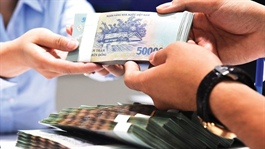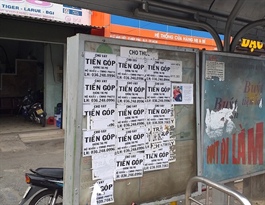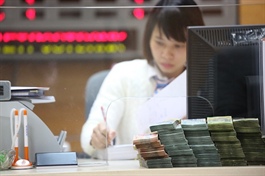Tax tweak deemed essential to shield digital economy
Tax tweak deemed essential to shield digital economy
Commercial banks are being required to provide information of taxpayers’ payment bank accounts and transactions to the tax department, as Vietnamese authorities aim to create a level playing field in an open digital economy.

Tax tweak deemed essential to shield digital economy (shutterstock)
|
As economies are on the front lines of intense digital transformation, market watchdogs suggest Vietnamese authorities need to find ways to reach a consensus for taxation regulations on the nation’s digital economy, with the cooperation from all relevant parties, including banks.
Decree No.126/2020/ND-CP on providing further guidance on the implementation of the Law on Tax 2019, which came into effect on December 5, is applicable to the management of taxes and other state budget revenues, except for such enterprises with associated transactions, application of invoices, documents, and sanctioning of administrative violations in the tax field, and invoices, sanctioning of administrative violations in the customs field.
As such, banks and payment intermediary services providers are required to provide essential information of taxpayers’ payment bank accounts to the local tax authorities.
Dang Ngoc Minh, deputy director of the General Department of Taxation, said that there is a considerable number of business activities occurring through popular digital platforms, such as Amazon, Facebook, Google, and YouTube.
Hence, information of taxpayers’ payment accounts and their transactions will help the tax authorities to track, inspect, and verify payable tax obligations based on cross-border and e-commerce businesses.
“All taxpayers’ information is strictly confidential. The tax agency will request banks to provide bank account details for specific cases and subjects only, not the full accounts or balance of customers. The request is mainly for inspection and examination to create a level playing field, as well as maintain fairness in sustaining a digital economy,” Minh added.
The impact of the government’s effort to improve digital taxation rules can be enormous. According to a recent report on Southeast Asia’s Internet economy released by Google, Temasek and Bain & Company, Vietnam’s internet economy would be worth about $52 billion by 2025.
Hoang Minh Hoan, deputy general director of Saigon Commercial Bank, said that lenders will comply with the current law enacted by the Vietnamese authorities, but the new initiatives of Decree 126 could stir major concerns for customers regarding to their privacy.
“Changes with the new decree are meant to address a regulatory imbalance between traditional and digitally-led businesses. However, local authorities need to provide more detailed regulations on which specific cases the tax authorities are entitled to request bank account and transaction information, and how much of the information is needed upon request,” Hoan said.
Nguyen Thi Phuong, deputy general director at state-owned lender Agribank suggested that leaders of banking and taxation departments should come up with a mutual agreement with efficient implementation on digital tax and privacy right.
“There must be a national payment information and data system so that stakeholders and relevant parties can be automatically connected, similar to accessing customer’s credit information data at the State Bank of Vietnam’s Credit Information Centre. It is difficult for banks to track, access, and provide essential data on a mass basis to meet tax department’s requirements,” she stated.
Besides this, Phuong said, the relevant authorities must also consider and prepare information sharing mechanisms with each other. Sharing information should ensure safety requirements for both banks and customers.
Elsewhere, many countries have already started to implement a series of unilateral tax policies to capture the fish that has slipped through the net.
For instance, Indonesia, Southeast Asia’s largest economy, has begun collecting 10-per-cent VAT since mid-2020 on digital products and services from internet-based firms. Meanwhile, G20 nations and the Organisation for Economic Co-operation and Development could still not reach an agreement on digital taxes. The EU is also considering going ahead with a bloc-wide tax on digital services if a global deal is not reached by mid-2021, stated Reuters.
Elsewhere, Thailand is requiring foreign digital platforms that lack a local subsidiary and make more than $57,000 a year to pay a 7-per-cent sales tax.
Nikkei Asian Review reported that Singapore and Malaysia have been implementing digital tax regimes for overseas players this year, with Singapore targeting imported services for Singaporean consumers, and Malaysia imposing a 6-per-cent service tax on foreign providers with annual turnover exceeding $120,000.
In October, the General Department of Taxation (GDT) of Vietnam required the American streaming behemoth Netflix to furnish details about its revenues in Vietnam since 2016 in a bid to assess the company’s taxes.
Vu Manh Cuong, director of the inspection agency under the GDT, said Vietnam’s Law on Cybersecurity requires all foreign businesses which have income from online activities in the country to store its data in the country and submit their business figures to tax authorities for collection.
The law, which came into effect this year, also requires foreign businesses to provide users’ data to the Ministry of Public Security if it wants to facilitate investigations on any infringements.

























